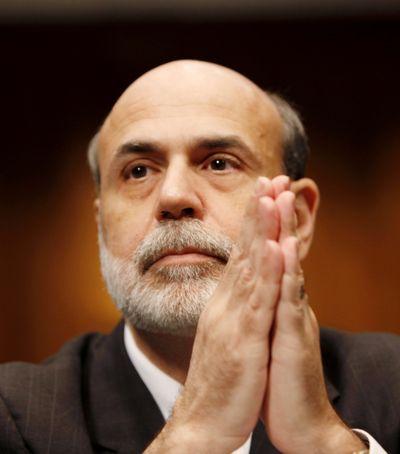Bernanke grows bullish
Fed boss says U.S. economy should start growing again soon

JACKSON, Wyo. – Federal Reserve Chairman Ben Bernanke on Friday offered his most optimistic outlook since the financial crisis struck, saying the economy is on the verge of growing again.
Speaking at an annual Fed conference, Bernanke acknowledged no missteps by the central bank in managing the worst crisis since the Great Depression. But he conceded that consumers and businesses are still having trouble getting loans, even though the financial system is gradually stabilizing.
Economic activity in both the U.S. and around the world seems to be leveling out, and the economy is likely to start growing again soon, Bernanke said.
Bernanke’s hopeful remarks on the economy contributed to a rally on Wall Street. The Dow Jones industrial average surged about 155 points, or 1.7 percent, and broader stock averages also gained sharply.
Despite his upbeat tone, Bernanke cautioned that the recovery is likely to be “relatively slow at first.”
Unemployment, now at 9.4 percent, is widely expected to hit double digits later this year and to remain high for many months.
The financial markets have stabilized, and some businesses and consumers have found it easier to get loans. Still, the banking system has yet to return to normal, Bernanke said.
Financial institutions face further losses on soured investments. And many businesses and households still can’t get the credit they need to fuel the economy, he said.
“Although we have avoided the worst, difficult challenges still lie ahead,” Bernanke told the gathering of fellow bankers, academics and economists. “We must work together to build on the gains already made to secure a sustained economic recovery.”
Reviewing the past year’s crisis, Bernanke outlined the many emergency measures the Fed and other regulators took to help ward off a global financial meltdown. He declined to acknowledge critics’ arguments that regulators failed to detect signs of the crisis before it occurred – or that Wall Street bailouts sent a message that big companies that make reckless bets would be rescued with taxpayer money.
A $700 billion taxpayer-funded bailout program to prop up financial institutions incensed many Americans. So did the repeated bailouts of AIG, which paid hefty bonuses to employees who worked in the division that brought down the firm.
Some analysts said Bernanke appeared to be angling to keep his job for another term.
“The lack of any mea culpa suggests the Fed chairman wants to be reappointed,” said Richard Yamarone, economist at Argus Research. “When you go on an interview, you never speak of your shortcomings.”
President Barack Obama will have to decide in coming months whether to reappoint or replace Bernanke, whose term expires early next year.
The bulk of Bernanke’s speech chronicled the extraordinary events of the past year.
Financial markets took a dizzying plunge starting in September and into October, nearly shutting down the flow of credit. The crisis felled storied Wall Street firms. The government took over mortgage giants Fannie Mae and Freddie Mac, as well as insurance titan American International Group Inc.
Lehman Brothers failed. It filed for bankruptcy on Sept. 15, the largest in corporate history, roiling markets worldwide.
The Fed swooped in with unprecedented emergency lending programs to fight the crisis. It eventually slashed a key bank lending rate to a record low near zero. And Congress enacted programs to stimulate the economy, including a $787 billion package of tax cuts and increased government spending.
“Without these speedy and forceful actions, last October’s panic would likely have continued to intensify, more major firms would have failed and the entire global financial system would have been at serious risk,” Bernanke said.
Unlike in the 1930s, Washington policymakers this time acted aggressively and quickly to contain the crisis, said Bernanke, a scholar of the Great Depression.
“As severe as the economic impact has been, however, the outcome could have been decidedly worse,” he said.
Global cooperation in battling the crisis was crucial, with central banks slashing interest rates and the U.S. and other governments delivering fiscal stimulus, he said.